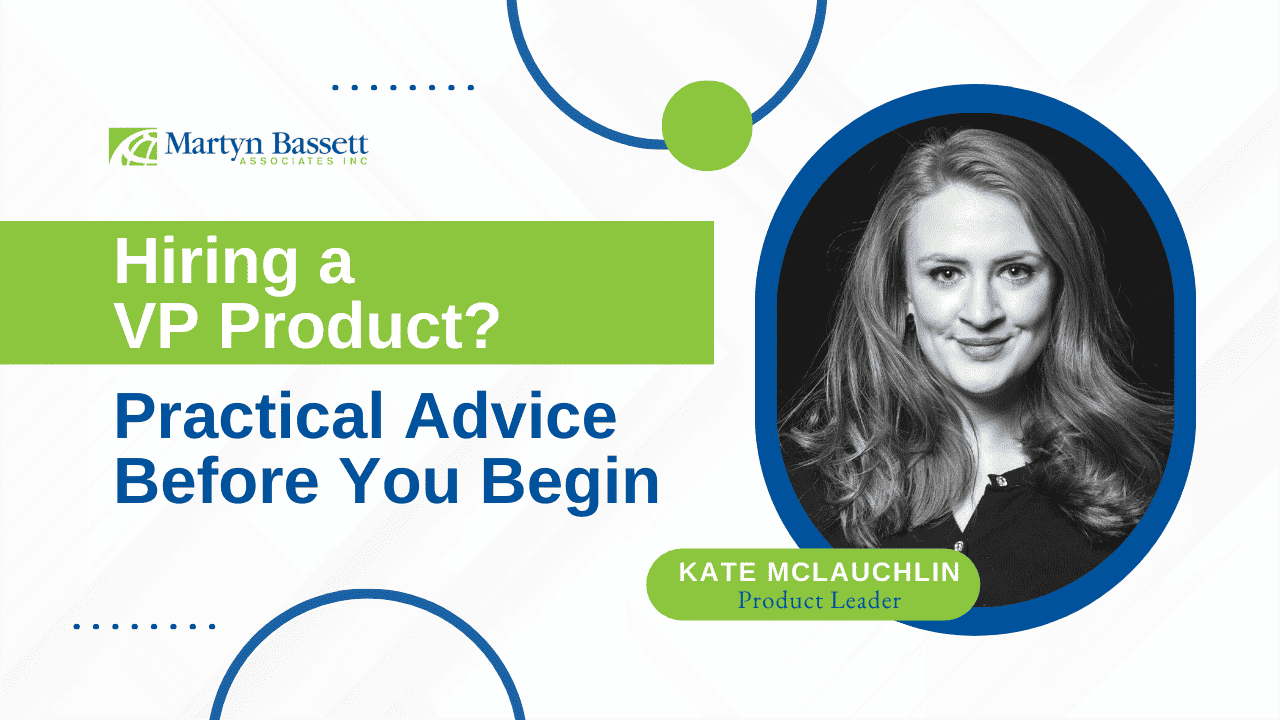Our team had the pleasure of sitting down with Product Leader, Kate McLauchlin to get her insights and advice for CEOs and Founders on a journey to hiring a VP product for their tech startups in 2024.
Kate is a product leader with over a decade of experience navigating diverse product landscapes. Her career journey encompasses roles in product companies, innovation labs, and technology consulting, which gives her a more diverse perspective and approach when tackling product and leadership challenges.
Let’s dive in!
What advice do you have for a Founder/CEO who is on a journey to hiring a VP Product?
I empathize with any Founder who is considering bringing on a product leader. That empathy is rooted not in the difficult task of building out your leadership team but in the far more daunting challenge of empowering someone else to take the reins on product decisions – something that the Founder has undoubtedly owned since the company’s inception. As you embark on this journey, here are some considerations for each stage of the hiring process:
Before Hiring
Before you commit to hiring a VP Product, ask yourself whether you are ready for the transition from personal ownership to collaborative leadership. Ensure you’re ready and able to set up an incoming product leader for success.
During Hiring
There is no typical product leader profile. Generalists, by nature, most product leaders will have the mental agility to succeed in the face of a variety of challenges. Don’t consider a product leader’s skills and experience in isolation. Carefully gauge a product leader’s strengths relative to your broader leadership team and assess how their collaboration will empower the organization to reach new heights.
After Hiring
Providing the product leader with the freedom to explore new perspectives is imperative – remember, you did say you were ready to hand over the reins. Now, more than ever, focus on articulating a clear vision and desired outcomes. Provide your new product leader with the space for innovation; to think differently about people, processes, and the product itself. In parallel, measure outcomes to ensure seamless integration of the product leader’s expertise into the company’s overall vision.
How does your diverse background (working in product companies, innovation labs, and consulting) contribute to your approach and success in leading a product organization?
Like so many product leaders, my experience is anything but linear. I started my product journey in a more traditional product role (if those exist) managing analytics tools for retail clients, spent time in an innovation lab exploring applications of new and emerging technologies, led the delivery of digital solutions as a client-facing technology consultant, and some might say, completed the cycle and found myself back at a product company where I lead product management, design, and marketing for a suite of AI-solutions.
These diverse experiences have profoundly influenced my approach and success in leading a product organization. Built on foundational knowledge of the software development lifecycle from my early product experience, the blend of experiences in innovation and consulting has equipped me with increased depth and breadth to work through the complexities of a product-led business.
My time in an innovation lab honed my discovery skills, emphasizing user feedback, prototyping, and a fail-fast outlook in which investment is commensurate with risk. My time in technology consulting sharpened my ability to execute, focusing on implementation, testing, and maintenance.
These non-traditional product roles also cultivated an appreciation for emerging technologies, enhanced my ability to adapt to different industries, and tested my stakeholder management and people leadership skills in new ways. Each experience was like a crash course in a specific aspect of product leadership. Together with an outcomes-focused approach, these experiences have been crucial for leading teams in the ever-evolving tech industry landscape.
How does industry experience or subject matter expertise help or hurt an incoming product leader, and how should a Founder/CEO think about that when hiring a VP Product?
Industry experience can be a double-edged sword for incoming product leaders. A depth of industry knowledge can be a source of instant credibility for an incoming product leader. It is, however, also possible that an incoming product leader can lean too heavily on those past experiences and assume they already know your users and their challenges.
Regardless of a candidate’s knowledge of the landscape, effective product leadership requires that they instill a culture of testing assumptions, validating hypotheses, and pivoting as necessary. While industry knowledge can be beneficial, biases can also be brought into the decision-making process. It’s crucial to recognize that effective product leadership goes beyond familiarity with a specific sector, and it should not overshadow the leader’s commitment to rigorous discovery practices.
When hiring a VP Product, don’t overlook a candidate whose industry experience might not perfectly align. Look for those with experience tackling related challenges, a history of adaptability while delivering results, and an openness to continuous learning.
We want to thank Kate for her time and expertise in sharing these valuable insights with us! Ready to hire, but not sure about current product leader compensation? Take a look at our salary insights for a product leadership role taken from real search data.
